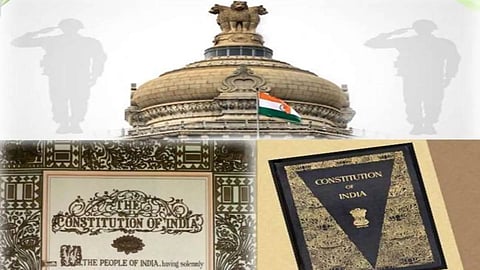
- Home
- Live Blog
- Breaking News
- Top Headlines
- Cities
- NE News
- Sentinel Media
- Sports
- Education
- Jobs

Constitution Day is not merely a remembrance of history – it is a commitment to the future. As we celebrate it, we must renew our national pledge: to protect the Constitution, to live by its values, and to build the India envisioned by its framers – just, equal, free, and fraternal — Lalit Garg
The constitution of any nation defines its character, dignity, and direction. It is not merely a legal manuscript; it is a living value system that shapes the soul of a nation. Constitution Day reminds us that the stability, unity, and progress of a vast and diverse democracy like India rests upon the foresight, generosity, and balance embedded in our Constitution. True good governance begins with an unwavering commitment to constitutional supremacy—not only in government but in every aspect of civic life, conduct, and thought. India’s Constitution, completed on 26 November 1949, stands among the most comprehensive and progressive constitutions of the world. Under the chairmanship of Dr B.R. Ambedkar, the Drafting Committee gave India a document that became the guiding light for a sovereign, socialist, secular, democratic republic. Since 2015, the Government of India has been observing 26 November as Constitution Day to commemorate Dr Ambedkar’s 125th birth anniversary; earlier, the day was known as Law Day. The Constitution was adopted after 2 years, 11 months, and 18 days of deliberation and came into force on 26 January 1950.
The Constitution grants us rights, but alongside it inspires duties. It equips us with justice, liberty, equality, and fraternity, yet also reminds us that safeguarding these ideals is the responsibility of every citizen. Wherever constitutional ethics begin to erode, democracy begins to falter. Therefore, respecting the Constitution is not a ritual—it is the foundation of national character. Today, as we mark Constitution Day, an essential question arises: Does the Constitution remain as relevant and powerful today as it was at its inception? The answer is an unequivocal yes. Societies evolve, challenges change, but the ideals of justice, liberty, equality, and fraternity remain timeless. The relevance of the Constitution is validated when rulers treat it as supreme and citizens embrace it as a moral compass.
In this context, it is important to reflect on how the Constitution is represented in public life. Simply holding a copy of the Constitution and displaying it in rallies—as some political leaders such as Rahul Gandhi often do—does not constitute genuine respect. Public display becomes meaningful only when accompanied by a sincere commitment to living its values, observing its provisions, and upholding its dignity. Waving the Constitution as a political weapon is a distortion of its sanctity; reducing it to a prop for theatrics undermines the seriousness with which it should be revered. The Constitution is not a banner; it is the nation’s guiding scripture—deserving of understanding, restraint, and integrity.
Dr B.R. Ambedkar repeatedly emphasised that a constitution, however strong, is only as effective as the people who implement it. He famously said, “A good constitution can become bad if those who implement it are bad.” His words remain profoundly relevant today. He envisioned the Constitution not as a tool of political combat but as an instrument of social reform and human uplift. To understand the Constitution, he argued, is to understand the very soul of Indian society.
Prime Minister Narendra Modi, too, has consistently upheld the Constitution as the supreme foundation of governance. He often describes it as “the sacred text of our democratic system.” For him, the Constitution is not merely a compilation of laws but the cornerstone of good governance, public trust, and nation-building. Under his leadership, efforts have been made to strengthen democratic institutions, promote transparency, protect citizens’ rights, and cultivate greater public awareness about constitutional responsibilities. His initiatives, from campaigns on constitutional duties to sustained emphasis on constitutional values in public life, have sought to transform Constitution Day from a formal event into a moment of national introspection. But constitutional respect is not the responsibility of the government alone. It must become an integral part of every citizen’s life. If we confine the Constitution to school textbooks, we weaken our democratic foundations. The true tribute to the Constitution lies in practising equality, choosing justice, upholding secularism, rejecting discrimination, and embracing dialogue and peace over violence or chaos.
At a time when intolerance, extremism, and political hostility are rising globally, the Indian Constitution serves as a cool, protective shade. It reminds us that a nation is not merely a battleground for power; it is a continuum of values. These values—justice, liberty, equality, and fraternity—are preserved and transmitted through the Constitution. Constitution Day urges us to honour the Constitution not only ceremonially but also in daily life. This requires strengthening constitutional education, reinforcing civic duties, and promoting constitutional behaviour at every level of society. The Constitution must rise above political disputes; it must not be reduced to a slogan or weapon. Instead, it should shine as a lighthouse guiding us toward a just, equitable, and peaceful society. If we honour the Constitution, the nation becomes stronger; if we violate it, democracy weakens.
Constitution Day is not merely a remembrance of history—it is a commitment to the future. As we celebrate it, we must renew our national pledge: to protect the Constitution, to live by its values, and to build the India envisioned by its framers—just, equal, free, and fraternal. In this lies India’s future, the strength of our democracy, and the soul of a progressive nation.